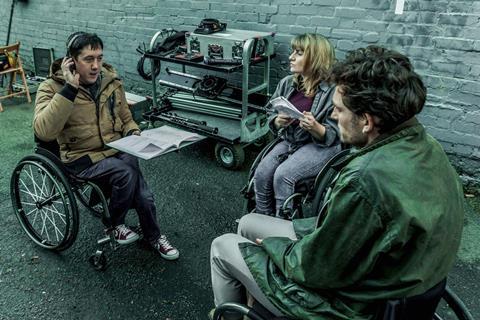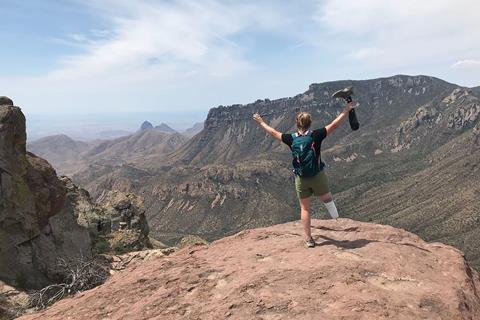
Juliet Romeo met Peter Baxter, the co-founder and president of Slamdance, on a Zoom session in mid-2020 where he offered advice to Miami-based filmmakers. She was struck by Baxter’s open-mindedness and contacted him to discuss her own films that explore people like herself living with sickle-cell disease.
That email snowballed, and Slamdance (running online from February 12-25, 2021) is launching its first Unstoppable programme, 22 shorts made by creators with disabilities, plus a series of themed talks and panels. Showcasing the work of disabled artists chimes with the Slamdance ethos: artist-led programming as well as a desire to “explore new forms of stories that we haven’t seen before that express truth”, Baxter says.
Romeo curated the selection alongside four other programmers — Gabriel Cordell, Asha Chai-Chang, Chris Furbee and Steve Way — who decided not to include any films with able-bodied actors playing disabled roles.
Way is a comedian and actor (Ramy) who also has muscular dystrophy. “What felt special to me was that I felt able to bring my past experiences, my personality, my world perspective into programming,” he says. “We researched if the actors were actually disabled. As an actor, that’s something I really fight for.”
They selected a diverse range of work, including Alison Becker’s satirical music video A$$ Level; Shaina Ghuraya’s sci-fi comedy Human Helper; Ashley Eakin’s anti-rom-com Single; Cameron S. Mitchell’s robbery story The Co-Op; and Rachel Handler and Catriona Rubenis-Stevens’ healthcare documentary How Much Am I Worth?.
“One of my main priorities was to have stories that were told about people with disabilities without the story just being their disability,” Romeo explains. “We are everyday people who fall in love, who can be the hero, who can chase down thieves and who can save the girl.”
UK actor, writer and director David Proud is thrilled his BFI-backed short Verisimilitude has been selected. The film — part of the Uncertain Kingdom 20-short anthology and telling a story about a disabled actress coaching an able-bodied actor — has already had a great run at festivals including Encounters and Palm Springs. “We wanted to spark that conversation about able-bodied actors playing disabled parts, it really hit at the right time,” he says. “Visibility is important, we need to be visible, to be out there. We need to be part of that conversation about film.”
The Unstoppable team hope other festivals will follow suit. “We’re showing the world this can be done,” says Way. “There is now no excuse as to why Sundance, Toronto or Tribeca can’t do this too.”
Ongoing support

There are already festivals that take disabled filmmakers and accessibility for audiences seriously; specialised events include Superfest in San Francisco, and the UK’s Oska Bright Film Festival and Together! Disability Film Festival.
Every major festival has an accessibility plan, and hybrid and online events can boost ways to reach disabled audiences. In 2021, Sundance is offering films with closed captioning and some with audio description. Its online talks and events will offer live captioning; and for all in-person, post-film Q&As, live American Sign Language (ASL) interpreting services are available on request.
The Berlinale’s offerings include German sign-language interpretation for discussions and/or films with German audio description via the Greta app. Cannes publishes a bespoke guidebook for visitors with disabilities, and its hospitality team also provides bespoke guidance. Toronto notes it has increased availability of Captiview and listening devices, more captioning and more information online about accessibility. It also offered on-demand ASL for its industry programmes in 2020. Venice says that “all our movie theatres are fully equipped for accessibility with detailed practical advice in our information service”.
Like Slamdance, Sydney Film Festival offers accessibility as well as visibility: its Screenability initiative started in 2016 in partnership with Create NSW as a platform for work by filmmakers with a disability. The programme runs alongside Create NSW’s disability internship scheme and a production fund for disabled filmmakers.
“The strand sought to validate disability cinema as a vibrant and provocative voice contributing to screen culture,” says writer/director Sofya Gollan, who is the investment manager and Screenability curator at Create NSW Screen. “[The festival] as a platform for exposure gave the filmmakers credibility as professional filmmakers, extending their networks with other practitioners.”
It was a sell-out for audiences too. Sydney staff train every year for best practice in access. Gollan suggests other festivals should “do an access audit with qualified organisations and recognise and accept that access will be a line item in the budget not once, not twice but ongoing”.
UK producer Lindsey Dryden, whose credits include Trans In America and Unrest, is a member of the BFI’s Disability Advisory Board. She has a wishlist for festivals: working with D/deaf and disabled programmers; requiring filmmakers to deliver captioned and audio-described films (and funding those costs); offering live-captioned and audio-described screenings; welcoming disabled critics; extending accessibility to social, pitching and networking events; working with fully accessible venues; and asking disabled filmmakers to give talks that are not about disability.
“As a filmmaker, I find it incredibly exciting when film organisations are not just dutiful about including D/deaf and disabled people, but excited about it — because this means they recognise we have value and should of course be included in culture and society,” says Dryden. “One in five people in the UK has a disability, many of which are invisible disabilities, and film festivals can do so much better both for filmmakers and audiences.”
Festivals can also benefit financially. “The disabled pound is estimated to be worth over £250bn [$347bn] per year to UK business,” Dryden notes.
She is also a founding member of Documentary Filmmakers With Disabilities (FWD-Doc), whose aims include working with “industry partners to write a set of tips, guidelines and resources for industry.” She also hopes the BFI’s Press Reset campaign — launched in July 2020 — “can provide the film industry with key action points for including D/deaf and disabled talent and audiences, and for thinking differently about representation, authenticity and equity”.
Proud, who is also on the BFI Disability Advisory Board and Bafta’s Film Committee, feels change is happening. “The diversity conversation took an extra step forward [in 2020]. The wind is in the sails and we’ve got a moment of change.”

























No comments yet